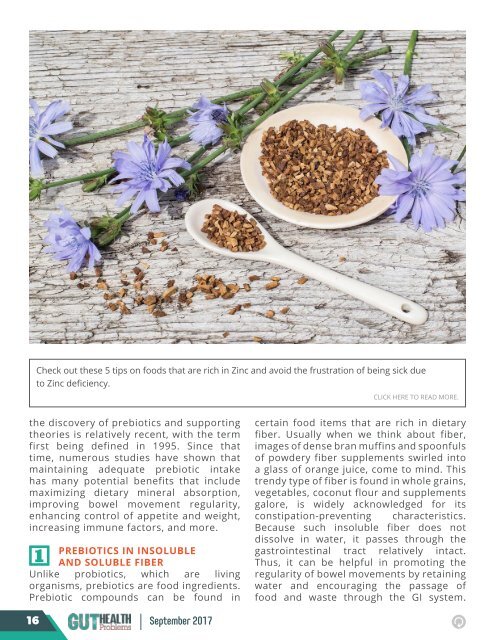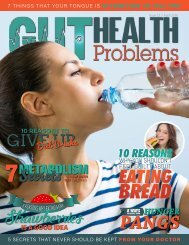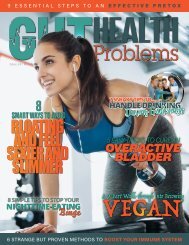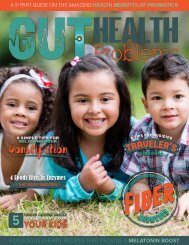Gut Health Problems - September 2017
In the eighth issue of Gut Health Problems, we have an overview of the vast benefits of probiotics, a checklist of foods rich in zinc, an intro to determining if you have fiber deficiency, and more. Intestinal discomfort, whether chronic or occasional, is something worth taking the time to prevent. And while we all have those foods that give us problems, you may actually be able to make a change that makes a bigger difference than you ever imagined.
In the eighth issue of Gut Health Problems, we have an overview of the vast benefits of probiotics, a checklist of foods rich in zinc, an intro to determining if you have fiber deficiency, and more. Intestinal discomfort, whether chronic or occasional, is something worth taking the time to prevent. And while we all have those foods that give us problems, you may actually be able to make a change that makes a bigger difference than you ever imagined.
You also want an ePaper? Increase the reach of your titles
YUMPU automatically turns print PDFs into web optimized ePapers that Google loves.
Check out these 5 tips on foods that are rich in Zinc and avoid the frustration of being sick due<br />
to Zinc deficiency.<br />
<br />
CLICK HERE TO READ MORE.<br />
the discovery of prebiotics and supporting<br />
theories is relatively recent, with the term<br />
first being defined in 1995. Since that<br />
time, numerous studies have shown that<br />
maintaining adequate prebiotic intake<br />
has many potential benefits that include<br />
maximizing dietary mineral absorption,<br />
improving bowel movement regularity,<br />
enhancing control of appetite and weight,<br />
increasing immune factors, and more.<br />
1<br />
PREBIOTICS IN INSOLUBLE<br />
AND SOLUBLE FIBER<br />
Unlike probiotics, which are living<br />
organisms, prebiotics are food ingredients.<br />
Prebiotic compounds can be found in<br />
certain food items that are rich in dietary<br />
fiber. Usually when we think about fiber,<br />
images of dense bran muffins and spoonfuls<br />
of powdery fiber supplements swirled into<br />
a glass of orange juice, come to mind. This<br />
trendy type of fiber is found in whole grains,<br />
vegetables, coconut flour and supplements<br />
galore, is widely acknowledged for its<br />
constipation-preventing characteristics.<br />
Because such insoluble fiber does not<br />
dissolve in water, it passes through the<br />
gastrointestinal tract relatively intact.<br />
Thus, it can be helpful in promoting the<br />
regularity of bowel movements by retaining<br />
water and encouraging the passage of<br />
food and waste through the GI system.<br />
16<br />
<strong>September</strong> <strong>2017</strong>

















